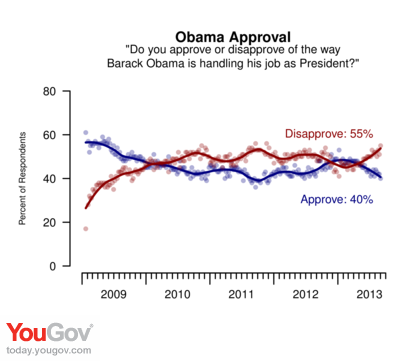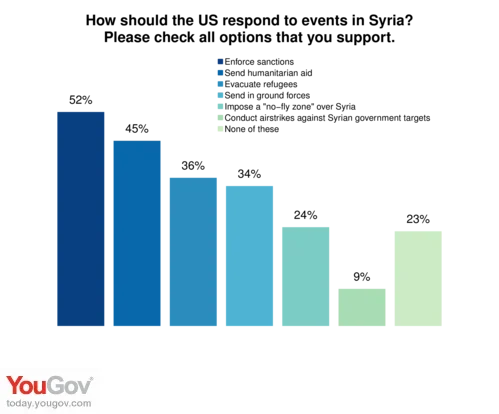(Week of September 2, 2013) Americans continue to strongly disagree with President Obama’s plan to strike Syria in retaliation for its use of chemical weapons. Although most in the latest Economist/YouGov Poll believe that using chemical weapons is a war crime – and should be punished – only 20% want the United States to take military action to punish the Syrian government.

Last week, just 15% believed the United States should help the rebels in Syria – and just as many opposed intervention.
Both Republican and Democratic Congressional leaders have come out in favor of U.S. intervention. The public is also bi-partisan, but takes the opposite position: just one in five Democrats, Republicans, and independents support action in Syria. A decade after U.S. action against Iraq, and 12 years after intervention in Afghanistan, public opposition to additional military activity in the Middle East is overwhelming. Majorities in both parties want the United States to stay out.
The opposition to military intervention puts the public at odds with the President. By nearly two to one, Americans disapprove of how Barack Obama is handling the situation in Syria, not much different from their opinion last week.

Three out of four Republicans disapprove, but so do one in three Democrats.
Support for the President overall has dropped, too: this week, only 40% approve of how Barack Obama is handling his job – approaching his lowest rating ever in Economist/YouGov Polls.

Support for air strikes – the likeliest U.S. military action in Syria – has risen in the last week, but remains at just 24%. Last week, only 17% supported air strikes. There is also somewhat more support for sanctions, which is the only one of several possible U.S. responses that gets majority support in this week’s poll. 52% would support that effort, up from 44% last week.

The opposition to intervention does not mean that Americans approve of the Syrian government’s use of chemical weapons: 77% say it qualifies as a war crime. Only one in ten disagree. By more than three to one, Americans believe the international community has a responsibility to stop the use of such weapons.

However, for most Americans, Democrats and Republicans, the job of intervention belongs to the United Nations, not to the United States. By more than two to one, Americans say that the U.N. has a responsibility to intervene in trouble spots around the world. In last week’s poll, the public took the opposite position when asked whether the United States had such a responsibility.

While Americans say there should be international action, their aversion to the U.S. doing that extends to praising the action of the British Parliament, which last week voted against using military force in Syria. By 49% to 17%, the public thinks the Parliamentary vote was the right one.
The bi-partisan agreement – this time against American involvement in Syria – is rare in this era of polarized politics, though it has sometimes appeared when the public assesses international events and how a President should handle them. For example, in June 2011, at the time of the U.N.-backed intervention in Libya, majorities of both Republicans and Democrats agreed that when it came to the use of military force, the President should get Congressional approval when possible, but should not be required to get approval in emergencies. That is no longer the case. A plurality of Democrats still take that position, but most Republicans say the President should always get Congressional approval prior to the use of force, increasing the overall percentage who say that now.

Then, as now, just one in ten felt that the President as Commander in Chief did not need Congressional approval to commit troops.
The public consistently has favored Congressional review before the U.S. intervenes militarily. Before the 2003 war in Iraq, Republicans and Democrats also agreed that President George W. Bush needed to seek Congressional approval before committing U.S. troops.
There is one more area of bi-partisanship expressed in this poll. Four in ten Republicans and four in ten Democrats expect there will be U.S. military action in Syria. Only 13% think the government will refrain from acting.

Economist/YouGov poll archives can be found here
Images: Getty







